Debris found from missing EgyptAir plane
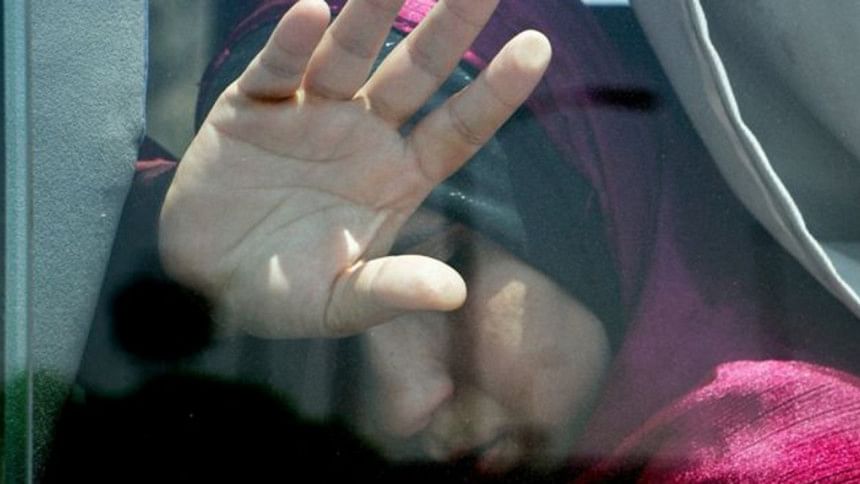
Debris from the missing EgyptAir flight has been found floating in the Mediterranean, Egyptian officials say.
Flight MS804 was en route from Paris to Cairo with 66 passengers and crew when it vanished early on Thursday.
Egypt's army spokesman said wreckage and passenger belongings were found 290km (180 miles) from Alexandria.
Greek Defence Minister Panos Kammenos said a body part, two seats and at least one suitcase had been found.
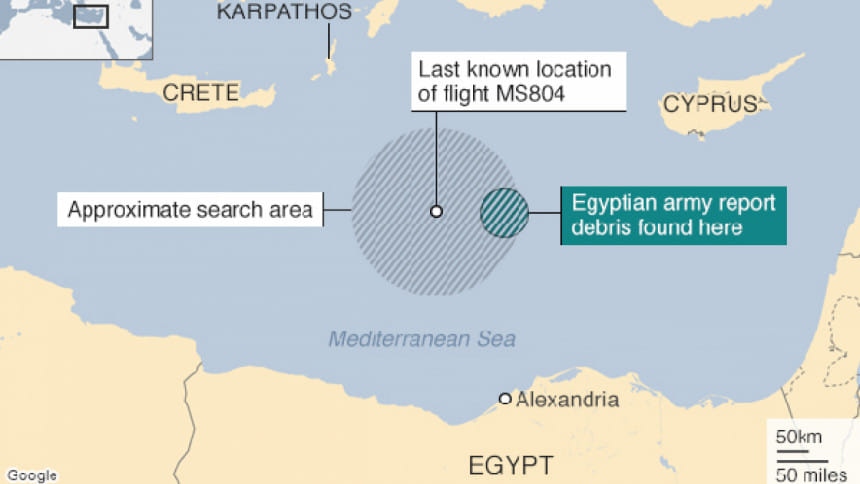
The search is now focused on finding the plane's flight recorders, the Associated Press news agency reports.
In a statement, President Abdel Fattah al-Sisi spoke of his "utmost sadness and regret" at the crash.
Greek, Egyptian, French and UK military units have been taking part in a search operation near Greece's Karpathos island.
Greece said radar showed the Airbus A320 had made two sharp turns and dropped more than 25,000ft (7,620m) before plunging into the sea.
THE FOCUS OF THE INVESTIGATION
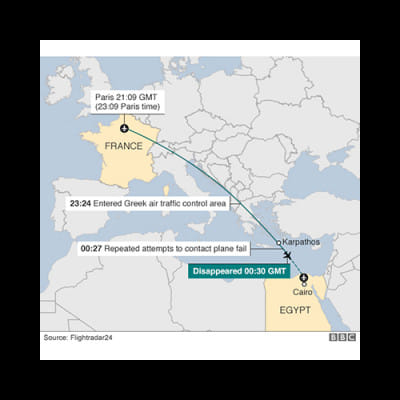
Egypt says the plane was more likely to have been brought down by a terrorist act than a technical fault.
However, there has been "absolutely no indication" so far as to why the plane came down, French Foreign Minister Jean-Marc Ayrault said on Friday morning.
Three investigators from the French air accident investigation bureau, along with a technical adviser from Airbus, have joined the Egyptian inquiry.
In France, the focus is on whether a possible breach of security happened at Paris Charles de Gaulle airport.
After last November's Paris attacks, some airport staff had their security clearance revoked over fears of links to Islamic extremists.
Eric Moutet, a lawyer for some of those employees, told the BBC that there had been attempts by Islamists to recruit airport staff.
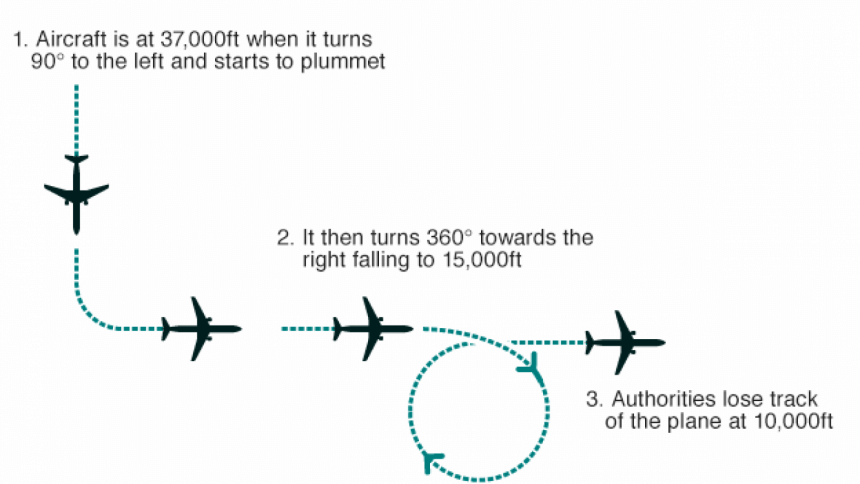
"That is clear. There are people who are being radicalised in some of the trade unions, etc. The authorities have their work cut out with this problem," he said.
In October, an Airbus A321 operated by Russia's Metrojet blew up over Egypt's Sinai Peninsula, killing all 224 people on board. Sinai Province, a local affiliate of the Islamic State jihadist group, said it had smuggled a bomb on board.
French President Francois Hollande said: "We will draw conclusions when we have the truth about what happened.
"Whether it was an accident, or whether it was - and it's something that is on our minds - terrorism."
WHAT DO WE KNOW ABOUT WHAT HAPPENED?
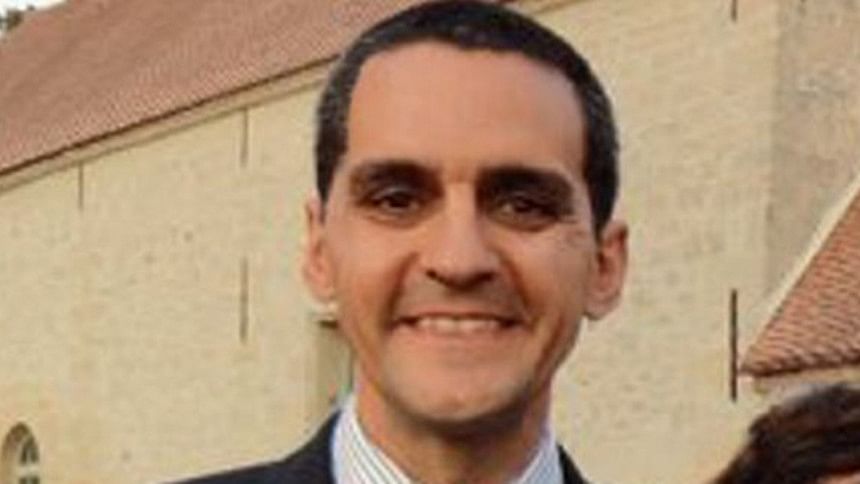
Flight MS804 left Paris at 23:09 local time on Wednesday (21:09 GMT) and was scheduled to arrive in the Egyptian capital soon after 03:15 local time (01:15 GMT) on Thursday.
On the plane were 56 passengers, seven crew members and three security personnel.
Greek aviation officials say air traffic controllers spoke to the pilot when he entered Greek airspace and everything appeared normal.
They tried to contact him again at 02:27 Cairo time, as the plane was set to enter Egyptian airspace, but "despite repeated calls, the aircraft did not respond". Two minutes later it vanished from radar.
Kammenos, the Greek defence minister, told reporters on Thursday: "The picture we have at the moment of the accident as it emerges from the Greek air force operations centre is that the aircraft was approximately 10-15 miles inside the Egyptian FIR [flight information region] and at an altitude of 37,000 feet.
"It turned 90 degrees left and then a 360-degree turn toward the right, dropping from 37,000 to 15,000 feet and then it was lost at about 10,000 feet."
Egyptian Aviation Minister Sherif Fathi said: "Let's not try to jump to the side that is trying to identify this as a technical failure - on the contrary.
"If you analyse the situation properly, the possibility of having a different action, or having a terror attack, is higher than the possibility of having a technical [fault]."
The BBC's transport correspondent Richard Westcott said much remains uncertain - the fact the plane swerved and dropped height could indicate a fight in the cockpit, or a struggle to control the plane. But each theory presents its own problems, he said.
One troubling aspect, he said, is an apparent 12-minute gap between the crew no longer speaking to air traffic control and the aircraft dropping from the radar.
The names of some of those who were on board have emerged, but most have not been identified publicly.
THOSE ON BOARD INCLUDED:
Richard Osman, a 40-year-old geologist and father-of-two from South Wales;
Canadian national Marwa Hamdy, a mother-of-three and an executive with IBM originally from Saskatchewan, but who had relocated to Cairo;
Pascal Hess, a photographer from Normandy, France, who had lost his passport last week - only for it to be found in the street, allowing him to catch the flight;
An unnamed couple in their 40s from Angers in north-west France, as well as their two children;
Ahmed Helal, the Egyptian-born manager of a Procter and Gamble plant in Amiens, northern France.

 For all latest news, follow The Daily Star's Google News channel.
For all latest news, follow The Daily Star's Google News channel. 


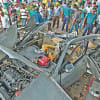





Comments